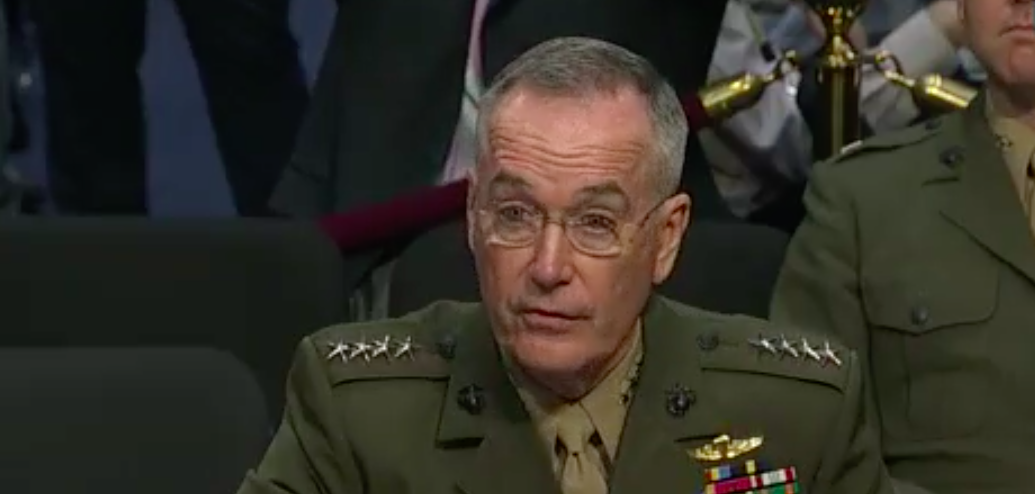
Gen. Joseph Dunford testifies before the Senate Armed Services Committee on Sept. 26, 2017, for his reappointment as Chairman of the Joint Chiefs of Staff. Screenshot photo.
The top US military officer told Congress Tuesday that repeated continuing resolutions to fund the federal government are limiting the nation’s ability to project power, reassure allies, and prevent conflict around the globe. As recently as 2000, the US had “a significant competitive advantage in our ability to project power when and where needed to advance our national interests,” Chairman of the Joint Chiefs of Staff Gen. Joseph Dunford told the Senate Armed Services Committee, on Tuesday. “I can’t say that today. We are challenged in our ability to project power both to Europe and the Pacific.”
In the near-term, Dunford said, the US military will require funding “somewhere between three and seven percent” of GDP “for us to build the capabilities we need.” He said his projections emerged from “a long journey of analytic rigor.” A central part of that study, Dunford said, was using “Russia and China to benchmark our capabilities.”
The funding levels Dunford recommends are necessary to maintain a “competitive advantage” over those near-peer nations, he insisted. Without military spending of three to seven percent of GDP, Dunford said the consequences could be drastic. “I wouldn’t assume access to space,” he said, “I wouldn’t assume our ability to protect our networks” from cyberattack. “I wouldn’t assume our ability to deal with the growing electronic warfare threat,” and “I wouldn’t assume our ability to deal with the growing ballistic missile and cruise missile threat.”
The impact is already being felt in US military units, Dunford said. Training hours are being cut short, including flight hours for pilots. “While we may have trained to standard in the past when we had sufficient time and resources,” Dunford said, “now we’re training to time.”
Committee chairman, Sen. John McCain (R-Ariz.), suggested the training deficit had led to increased accidents. “Our non-combat casualties and fatalities are now higher than operations in combat,” he said. Dunford agreed.
On the broadest scale, a failure to return to regular, and higher, funding would impact the way the US fights wars. “We will have to fundamentally reorder the strategy, if we are unable to build the capabilities and capacities to deal with those peer competitors,” Dunford said.
Dunford believes this would lead to more war. “One of the things that deters others today from a conventional conflict is their knowledge that we do have a competitive, conventional advantage over any adversary today,” Dunford said. If the US loses that advantage, Dunford said, “There would be an increased possibility of conflict.”